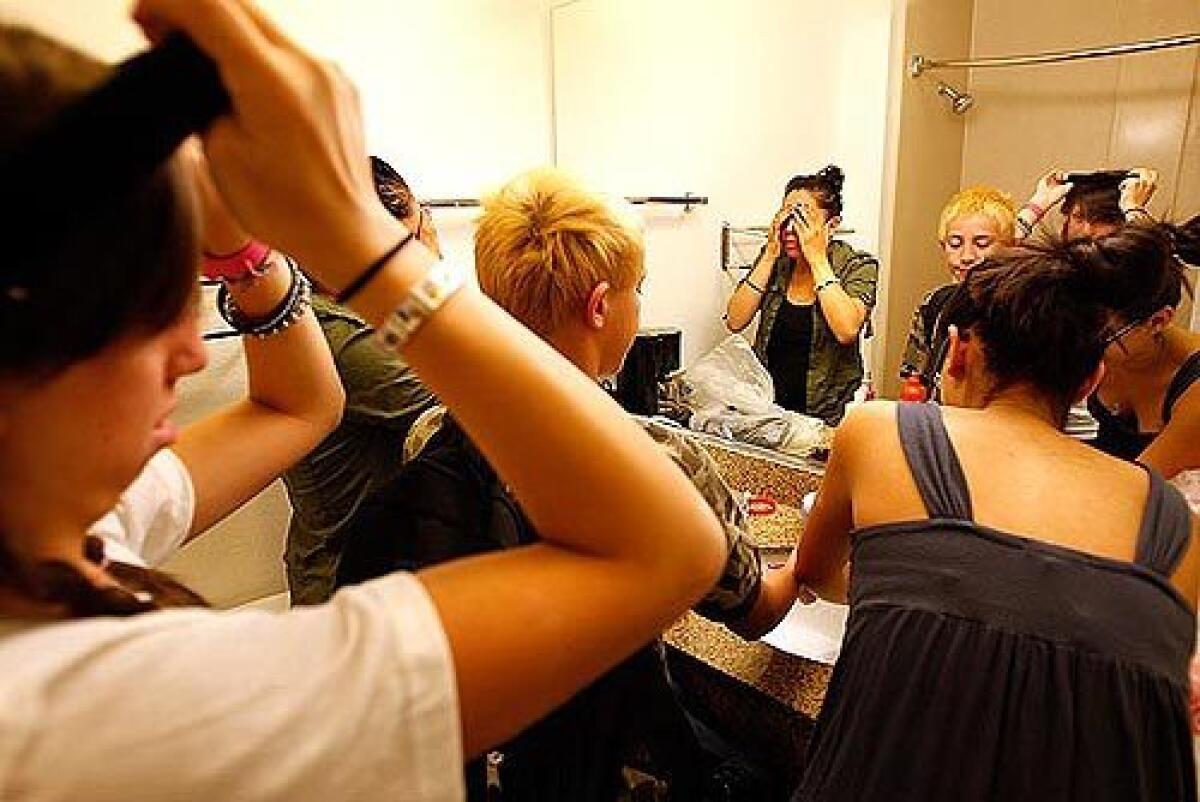A family becomes collateral damage from the Sylmar wildfire

- Share via
In one bedroom, there is still a stack of hand-written flashcards on the windowsill, where one of the twins left them: Anomalous. Antipathy. Assuage. On the floor, there is a little box of nail polish -- lime green, another called “berry framboise.” On the wall, a calendar maps out a teenager’s month: vocab quiz. mock trial. driver test.
Walk down the hall, through the little house on Deodar Road, and it’s all the same: baseball trophies, half-finished homework describing the polarity of water molecules, a gossip magazine opened to a picture of Suri Cruise. It’s all familiar, a mosaic of a cluttered, harried, working-class life.
It’s as if nothing ever happened. Except no one lives here anymore.
Earlier this month, fire erupted in the hills above Sylmar. It blew through Oakridge Mobile Home Park, burning with such ferocity that rain gutters turned into pools of molten metal and car tires were melted down to tangled nests of steel radials.
The fire rode on the wind through Oakridge’s tidy, winding streets, leveling 500 of 600 homes. It destroyed every house behind this one, to the north, and leveled a nearby grove of eucalyptus trees. It marched into Katrina Vieana’s yard, blackening a section of her fence 20 feet from the back door. And that’s where it stopped.
This is what it looks like at the fire’s edge: a life on hold, a family stuck with a house that is at once unscathed and, because Oakridge is closed to residents and could remain that way for quite awhile, uninhabitable.
Vieana, 36, a legal secretary who lived here with her boyfriend and six of her seven children, would never stoop to compare herself with those who lost everything.
One of her neighbors bought a colander the other day and used it to sift through the ashes in search of diamond rings. When authorities did a sweep with dogs trained to find human remains, one of Vieana’s neighbors had to explain that when she fled, she couldn’t take the urn containing her husband’s ashes. Now they were buried in the rubble; she was afraid they might give the dogs a false positive.
Vieana’s house is covered with a fine layer of soot, and her belongings smell like smoke -- not insignificant, but hardly the same fate, she knows.
“I know I am one of the lucky ones,” Vieana said. “But in a sense, at least they know what they lost. They know where they stand. We didn’t lose our home, but we can’t live here. So what do we do?”
She cannot sell, she said; her family still owes $158,000 on the house, and it’s not worth that -- not anymore, not in this market, not in Sylmar, which had plenty of troubles before the fire.
She just moved herself and six children into a two-bedroom apartment but is already choosing between paying her mortgage, which saps more than half of her take-home pay, and paying the rent on her new place.
“What are they going to do?” she said, throwing up her hands. “Repo the house?”
Even if Oakridge reopened, she’s not sure she’d return. Who would want to be the first one back? It will take months to haul away the ashes, the charred carcasses of the houses, and who wants to see that every day? Her children don’t. Her youngest, 3-year-old Lucas, was the first of her kids to see the damage.
“Mommy,” he told her, “all the houses are broken.”
She is left, she said, with the unthinkable.
“I wish mine would’ve burned down too,” she said, sweeping a foot through a pile of dust and ash that has gathered in her carport. “I really do.”
The night of Nov. 14, Vieana and her boyfriend, Art Burgueno, 40, a driver for a swimming pool company, made carne asada for dinner. There had been a sale at the market, $2.99 a pound.
After dinner, Burgueno flipped on the news. There was a fire, he told her, near the house. “I don’t have time for that,” she told him with a laugh, and she didn’t. She hasn’t had time for any life interruptions for a long time.
Vieana had just graduated from Sylmar High when she got pregnant the first time. She was 18. She had twins, Kayla and Kaitlin. She married another man a short time later and had three more children: Alicia, 15; Junior, 13; and Ryan, 11. (Junior lives with his father and spends every other weekend with her; he was with her the night of the fire.) After her divorce, she met Burgueno while playing in a community softball league. They had two more children, 4-year-old Brienna and Lucas.
“It just sort of happened,” she said with a shrug.
For a long time now, life has bordered on manic, each day a dizzying triage of pickups and drop-offs, baseball games and mass feedings.
The twins are organizing a blood drive at school. Kaitlin recently got a tongue piercing without her mother’s approval. Kayla just found out that the school might not let her go to the prom because she ditched gym class too many times. Lucas has been having nightmares.
Vieana has no savings; Kayla works as a cashier after school, and Vieana recently had to ask her to start paying for Brienna’s tumbling classes.
And now this.
On a recent morning, Vieana walked into the Sylmar Recreation Center, where authorities had put together a one-stop shopping center for disaster assistance.
It was an impressive display. The little gym, with the names of past years’ regional baseball champions on the wall, was jammed with nonprofit and government representatives. Unfortunately, one agency -- the Federal Emergency Management Agency -- was not there, despite assurances Vieana had received the day before.
“Everything else feeds off FEMA,” said her stepfather, Robert Smith, who was helping. “We can’t do anything until they get here.”
Before she left, Vieana dropped by a table to speak with state employment specialists. A doctor had ordered her not to work -- and prescribed Xanax to calm her nerves -- but she said she was under pressure to return to work.
“My boss is giving me a really hard time,” she told the man behind the table. He offered her some assurances, though nothing specific.
She left, racing over to Oakridge to pick up some documents from the house, driving past the community-announcement sign that still said: “Bingo Tues. 7 p.m.” Twenty minutes later, she raced into a Reseda furniture store where she’d heard there was a decent sale. She opened the door and seemed overwhelmed by the choices.
“Think about what you absolutely, positively need,” Smith, 56, told her. “Everybody needs a place to sleep. That’s the most important thing.”
Putting seven people into two bedrooms -- Burgueno is going to stay with relatives -- is something of an art. Should she go for the sleeper couch for $688? Or should she go for the regular couch for $388 -- forgoing one bed, but assuming that Ryan and Lucas will crawl into bed with her like always? Could she save money if she bought the beds here but bought the mattresses somewhere else?
Within 45 minutes, she had bought $2,333 worth of furniture: two dressers, a couch -- the regular one -- and three beds. She bought it on a finance plan and will pay it off over the next two years. She walked out, toward her car, toward the next stop.
There have been some small victories; her insurance company, for instance, recently cut her a check for $10,000 to cover living expenses. And people have been very kind, she said. Burgueno’s company put them all up in a hotel for a few days. Ryan’s baseball team, the Van Nuys Tigers, offered to buy him a new pair of cleats.
But her to-do list was daunting.
She still needed to change her address at the DMV. The insurance adjuster needed to meet her at the house to assess smoke damage. She needed to pick up a cashier’s check to pay the rent at the apartment, but before she could do that she needed to find out how much the prorated rent would be for November.
Someone needed to call the mortgage company, which had so far agreed to give her only two weeks’ reprieve -- and had threatened to add a late fee. Someone needed to buy sheets, pillows, blankets. Kayla’s work uniform was still in the house and was too smelly to salvage; they’d have to buy another one. Their phones rang incessantly.
“I’m losing my mind,” she told her stepfather. “It’s not good.”
“One thing at a time,” he told her, putting a hand on her shoulder.
“I’m trying,” she said. “I’m trying.”
Gold is a Times staff writer.
More to Read
Sign up for Essential California
The most important California stories and recommendations in your inbox every morning.
You may occasionally receive promotional content from the Los Angeles Times.











